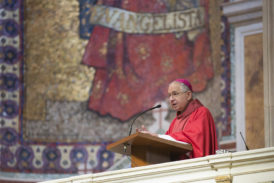
By Christopher White
The Tablet National Correspondent
WASHINGTON, DC. – Archbishop José H. Gomez used his homily at the 65th annual Red Mass to remind the country’s legal professionals of America’s strong tradition of welcoming immigrants and promoting religious freedom for all.
“In God’s eyes, there are no foreigners, there are no strangers,” said Archbishop Gomez. “All of us are family. When God looks at us, he sees beyond the color of our skin, or the countries where we come from, or the language that we speak. God sees only his children-sons and daughters made in his image.”
The Red Mass is celebrated each year for those working in law and government and dates back to approximately 1310 in England, following similar services in Paris.
The name of the Mass is taken from the red vestments worn by the celebrant to signify the fire of the Holy Spirit.
The Red Mass is traditionally celebrated on the Sunday before the first Monday in October, which marks the beginning of the new Supreme Court term and is held at St. Matthew’s Cathedral in the nation’s capital.
In attendance were Justices Samuel Alito, Anthony Kennedy, Stephen Breyer, Clarence Thomas and Chief Justice Roberts. Breyer is Jewish, while the other justices are Catholic.
Five of the nine justices on the current court are Roman Catholic.
“America’s first beginnings were not political,” said Archbishop Gomez. “America’s first beginnings were spiritual.”
“The missionaries came here first-long before the Pilgrims, long before George Washington and Thomas Jefferson. Long before this country even had a name. These missionaries – together with the colonists and the statesmen who came later – they laid the spiritual and intellectual groundwork for a nation that remains unique in human history,” he said.
Archbishop Gomez hails from Monterrey, Mexico and has been archbishop of Los Angeles since 2011. He leads one of the most ethnically diverse dioceses in the country.
“The Church in Los Angeles is the largest Catholic community in the country,” said the Archbishop.
“We are a global church, an immigrant church, made up of people who come from all over the world. We have about five million Catholics in L.A. and every day, we pray and worship and we serve in more than 40 different languages,” he said.
The Archbishop recalled Pope Francis’s visit to Washington, D.C. two years ago where he canonized Junípero Serra, a Franciscan missionary to California.
“In his time, there were many in the California colonial government who denied the full humanity of the indigenous peoples living in this land,” said Archbishop Gomez. “St. Junípero became their champion. He even wrote a ‘bill of rights’ to protect them. And by the way-he wrote that bill of rights-three years before America’s Declaration of Independence.”
“Most Americans do not know this history. But Pope Francis does,” he added.
He noted that Francis’s decision to canonize Father Serra in the nation’s capital was an intentional decision to remind Americans that Serra, too, was one of the founding fathers of the United States.
Father Serra was canonized on the grounds of The Catholic University of America as part of Francis’s visit to Washington, New York, and Philadelphia in September 2015.
While the Archbishop praised America for being a place where all people have been historically welcome, he acknowledged that this is an ongoing challenge. In a nod to the current national tensions surrounding race relations, Archbishop Gomez said the country has yet to live up to its own ideals.
“From the original sins of slavery and the cruel mistreatment of native peoples, to our struggles today with racism and nativism – the American dream is still a work in progress,” he said.
In recent years Archbishop Gomez, who is the vice president of the United States Conference of Catholic Bishops, has become one of the leading voices on immigration in the American church hierarchy and often uses his major public addresses to make the Church’s case for welcoming immigrants.
“Let us commit ourselves to an America that cares for the young and the elderly, for the poor and the sick; an America where the hungry find bread and the homeless a place to live,” said Archbishop Gomez.
“An America that welcomes the immigrant and refugee and offers the prisoner a second chance.”
